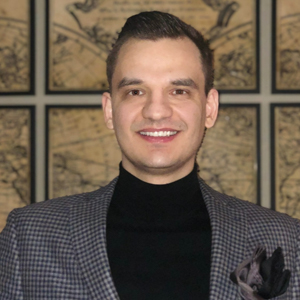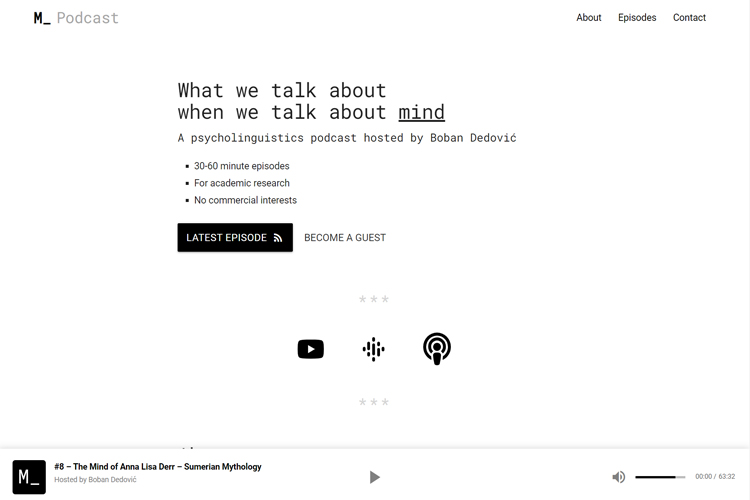Credits
Partial Transcript
Boban Dedović Host
00:11 Hello, I'm Boban Dedović and this is episode seven of the "What we talk about when we talk about mind" podcast.
Boban Dedović Host
00:18 Today I have the pleasure of sitting down with Orin Hargraves. He's an American lexicographer that's published several books and other related contributions to the field of dictionaries, lexicography, idioms, slang, and other topics of interest to psychology and language. He attended the University of Chicago, where he received an undergraduate degree, and he's currently affiliated with the University of Colorado at Boulder. He also holds a prominent position in the Dictionary Society of North America, which is holding a conference in the next few months at the end of May.
Boban Dedović Host
01:00 Today we're going to talk about a number of interesting topics that range from the interdisciplinary nature of making dictionaries, working on them, as well as how venues like conferences are very important for getting like-minded people together to continue to make progress and share ideas. We also talk about ChatGPT, a little bit about artificial intelligence, as well as the important role that computational linguistics plays in the field of lexicography. I'm very excited to discuss with him what he talks about when he talks about mind.
Boban Dedović Host
01:38 Our book recommendation for this episode is going to be the Oxford Latin Dictionary, which was completed fully by 1982, and the chief editor is P.G.W. Glare. It's a Latin dictionary that contains close to 2,300 pages and has many terms that you would ever hope to find in the absolute de facto standard for advanced study when it comes to the Classical Latin language. Again, the book recommendation, if you're interested in advanced study of the Latin language, would be the Oxford Latin Dictionary, and it was fully completed by editor in charge, P.G.W. Glare, in 1982.
Boban Dedović Host
02:24 The "mind" word for the day is pronounced srce. Srce is a word that generally means "heart" or it can mean "mind," or "emotion," or "will," and it comes to us from the modern day Serbian-Croatian-Bosnian language families that are in the Balkans. The word srce is more closely related to the English word "heart" and the three consonants at the beginning are known as a consonant cluster: S-R-C-E. So the way you pronounce three consonants in this specific language is you have to treat the r as if it has an "uuh" or a vowel in front of it. So it's pronounced srce. And one use of this expression would be srce moje govori jezikom ljubavi; and this translates to "my heart communicates (or speaks) the language of love." So the hat for the day contains the word srce, which gets translated as "heart" in languages like Bosnian-Serbian-Croatian.
Boban Dedović Host
03:29 Hey Orin, how are you doing today?
Orin Hargraves Guest
03:31 Yeah, I'm good. It's a very cold day here. It's ten degrees and we have new snow on the ground, but it's warm at home.
Boban Dedović Host
03:39 I'd like to learn more about your background, your research foci, and some of your areas of interest. Would you be able to talk a little bit about that?
Orin Hargraves Guest
03:49 Sure. My background–well, let's say my background of interest–is certainly in language. That, in a nutshell, is why I became a lexicographer. I studied, well the program I was in, you have some experience with the University of Chicago, so you know what it's like. I was in a program called General Studies in the Humanities, which, it's what it sounds like, a good, solid humanities background education.
Orin Hargraves Guest
04:17 And when I was finished, I immediately went on a vacation and I took two books with me, Language by Sapir and Language by Jesperson. Because I think, finally, at the end of my college degree, I knew what I wanted to study: language. I think I've always been interested in writing because I've always been a good reader. Especially as a child, I think some of my most intense experiences came from reading and so I was interested in how you could go about creating such an intense experience for someone else simply through the medium of language.
Orin Hargraves Guest
04:56 So writing interested me and, by small stages, that drew me to lexicography; that is, defining words. And that's what I've been doing for about 30 years now. Other things I've done along the way, like teaching semantics, which I do currently from time to time, and doing some NLP research, those came about completely on the basis of my background in lexicography. Without having been a lexicographer, those opportunities wouldn't have presented themselves.
Boban Dedović Host
05:27 I believe you mentioned that you were currently working at the University of Colorado at Boulder.
Orin Hargraves Guest
05:34 Yeah, I am a contract instructor, what they call a lecturer here, which means I don't have a full time job there. But when they have a course available for me to teach that I want to teach; and, currently, that's only one course, semantics, I teach it. It's an upper level undergraduate course. It's required for all linguistics majors and minors and it's just what it sounds like. It's a course about how language acquires and conveys, encodes meaning.
Orin Hargraves Guest
06:05 And, to my surprise, it's kind of a revelation, often for students, even all of my students have been in linguistics for two to three years, but most of them have just had the barest introduction to semantics as a subfield of linguistics. And when they start to understand how wide and deep semantics is, it really opens up a lot of doors and leads them to think about language in a completely different and bigger way than they did before. So it's very satisfying for me to be able to open that door or to push it open for them.
The rest of this transcript is not quite ready. Check back soon.
Works Referenced
(In order of appearance)
Peter G.W. Glare, Oxford Latin Dictionary, vols. 1-8 (Oxford, England: Clarendon Press, 1982). [https://omnika.conscious.ai/stable/450]
Edward Sapir, Language: An Introduction to the Study of Speech (New York, NY: Harcourt, Brace, & Company, 1921).
Otto Jesperson, Language: Its Nature Development & Origin (New York, NY: W. W. Norton & Company, 1964).
Dictionary Society of North America, accessed Feb. 25, 2023, https://dictionarysociety.com.
David Crystal, ed., A Dictionary of Linguistics and Phonetics, 6ed. (Malden, MA: Blackwell Publishing, 2008).
John Simpson and Edmund Weiner, eds., Oxford English Dictionary, 2ed., 20 vols. (Oxford, United Kingdom: Clarendon Press, 1989).
Orin Hargraves, Mighty Fine Words and Smashing Expressions: Making Sense of Transatlantic English (Oxford, United Kingdom: Oxford University Press, 2003).
Orin Hargraves, Slang Rules!: A Practical Guide for English Learners (Springfield, MA: Merriam-Webster, 2008).
Orin Hargraves, It's Been Said Before: A Guide to the Use and Abuse of Clichés (Oxford, United Kingdom: Oxford University Press, 2014).
Julian Jaynes, The Origin of Consciousness in the Breakdown of the Bicameral Mind (Boston, MA: Houghton Mifflin, 1976). [https://omnika.conscious.ai/stable/345]
Charles S. Peirce, Peirce on Signs: Writings on Semiotic (Chapel Hill, NC: University of North Carolina Press, 1991).
Transcript Notes

Boban Dedović
Person · Psycholinguist
Boban Dedović (Apr. 8, 1989 –) is a Croatian-American psycholinguist, technologist, scholar of ancient languages, and podcast host. He was born in the former Yugoslavia and moved to the United States at the age of seven. He studied both religions of antiquity (B.A.) and social psychology (B.S.) at University of Maryland in College Park before earning his graduate degree from the University of Chicago... Read more
See also: mindspace.studio bobandedovic.com twitter.com

Mindspace Studio Podcast
Website by Boban Dedović
Mindspace Studio is a psycholinguistics-themed podcast hosted by Boban Dedović, a Croatian-American psycholinguist and technologist. It was started in January of 2021 while Dedović was a graduate researcher at the University of Chicago. The program provides thrity to sixty minute episodes focused on language, psychology, and other related fields of study. It is available on YouTube, Apple Podcasts, and Google Podcasts... Read more
See also: youtube.com podcasts.apple.com podcasts.google.com conscious.ai
Heads up
This page contains a Guided Transcript
Whenever you click on a blue link that contains the panel icon chrome_reader_mode, a knowledge panel will appear on the right side of your device.
These panels provide verified, accurate information about people, books, and other things that are relevant to the discussion. The links take you to relevant websites related to source materials, as shown below:
See also: mindspace.studio
